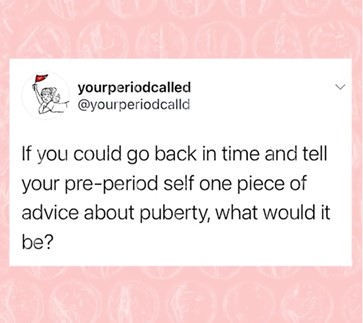
Discovering your menstruation as a spiritual practice
Yasmine understands her menstruation as a spiritual practice and shares in this interview how she is connecting more with her own body through cycle awareness.
Let’s talk about The Talk – you know “THE Talk” about the bees and the flowers. Because sooner or later kids starts asking questions about the human body and where babies actually come from. And in that exact moment you might be not prepared at all. So how and when should you talk to kids about sex? Jennifer from YourPeriodCalled put together a little guide for you. Let’s check it out!
This might be one of the hardest or most nerve-racking topics for parents to think about approaching with their kids. Sex is good and fun to talk about with pals over a glass of wine but approaching the topic with your 14-year-old might seem well … terrifying! The good news is that it won’t be as bad as you think it will be. The other good news is that we put together a guide for how to talk with kids about sex from their earliest years.
Sex is fun when it is healthy, consensual, and when we’re excited about what we are about to do. In reality, 40-85 % of children will have experienced some type of sexual exploration with children of the same age and body type, by the age of 13. How we view sex and sexuality does not start when we’re in puberty or start learning about sex in school (if your kid has those school programmes). It starts much, much younger. And healthy views and habits around sexuality are easier to develop with your kids than you think. We’re here to talk about when you should start talking to your kids about sex and sexuality, what they should know at what age, and how to keep your cool as a parent.

Reflect on when you started learning about sex. Was it from a teacher? A parent? A school peer? Did you find a magazine when you were snooping around your parent’s or older sibling’s room? Most of the time we learn about sex through channels that are not the most optimal for learning. These moments can shape our lives and views of what sex is supposed to be – whether that view is healthy or not.
A relationship-appropriate adult who talks about sex with an eleven-year-old, versus porn being a first encounter with “what sex looks like” will lead to very different foundational impressions of what sex is and can be. It’s important to talk to kids about sex and sexuality in ways that are appropriate to ages, what your kid needs, and who they are as a person, as early as three or four, and to revisit it over the years. Here’s how you do it:
Learning about ‘sex’ at three or four has nothing to do with actual sex and everything to do with boundary setting and the proper names for body parts. It’s highly possible (normal, healthy, and developmentally appropriate) that your children will start exploring their bodies at this age. If you find them touching themselves in ways that are sexual it’s perfectly fine. To them, it simply feels good, and they have no clue what they’re doing. It’s important in these moments to calmly tell them that it’s great to enjoy their bodies but that this is best done in private. This is a great age to tell them about “good” and “bad” touches. Good touches are things like hugging, holding hands, diaper changes, whereas bad touches are things that make them uncomfortable, or hitting and kicking, and that they should say “No!” when they feel unsafe.
In these ages, children are showing a deeper understanding of gender roles and might explore with their friends a bit. They’re curious about bodies and young males might start to experience erections. At this age, it’s important to tell them that erections are perfectly normal and that their bodies are getting older. Closer to eight you can tell them a bit more about how this is involved with human reproduction and include menstruation. It’s a great time to start talking or exposing your child to different sexual orientations, non-stereotypical gender roles, and how these are more fluid than simply “girls and boys”. If these folks aren’t in your community already, you can help foster this understanding and exposure through games, picture books, stories, movies or other media.
As puberty becomes closer, your kids will begin a natural process of wanting more space and independence. You can talk to kids about sex here by explaining how reproduction works. They will start feeling more sexual excitement and get more curious about experiences around sex, bodies, and may be more proactive about their curiosities at this age.
We live with access to the internet and it’s important to show children media literacy skills and set up parent protocols on devices. Show your kids where they can find reliable and reputable information on sex, sexual development and bodies. For menstruation you can always turn to Vulvani and YourPeriodCalled’s first period stories for ice-breakers. It’s a good time to start talking about internet safety and the risks associated with meeting people online. How to be respectful of others and respecting their boundaries becomes increasingly important as a skill (for adults, too).
You can do this through role-playing discussions on respect and boundaries. Creating some goal topics prior to your chat and creating a network of trust that your child knows they can go to with questions is helpful. Children are becoming more independent at this age and might turn to unhealthy information providers, like their peers or porn.

After twelve, your child has stepped into teenagerhood and will be well-prepped to be setting their boundaries, know that sexuality is nothing to be ashamed of, and have a support system they can turn to. While it might be uncomfortable, check in with your child at least once a year on how things are going, ask if they have questions, and remind them that your communication door is always open (and have it be open). This is around the age when menstruation starts and it’s time to talk to your healthcare provider about setting up their first sexual health check-up. Especially if they’re having relationships.
Before we wrap up, here are some additional tips:
Take a deep breath and know that you’ve got this! A well-prepared child starts with a parent taking the time and care to support their healthy development. If you have any questions, you can contact YourPeriodCalled or Jennifer directly.



Yasmine understands her menstruation as a spiritual practice and shares in this interview how she is connecting more with her own body through cycle awareness.

What options are there for male birth control? Ailsa delivers an overview of what is available now, and what may come in the future.

Sustainable underwear? The founders of TUKEA talk about fair labour conditions, body diversity and body literacy.
…and empower countless women to make empowered choices about their bodies!

